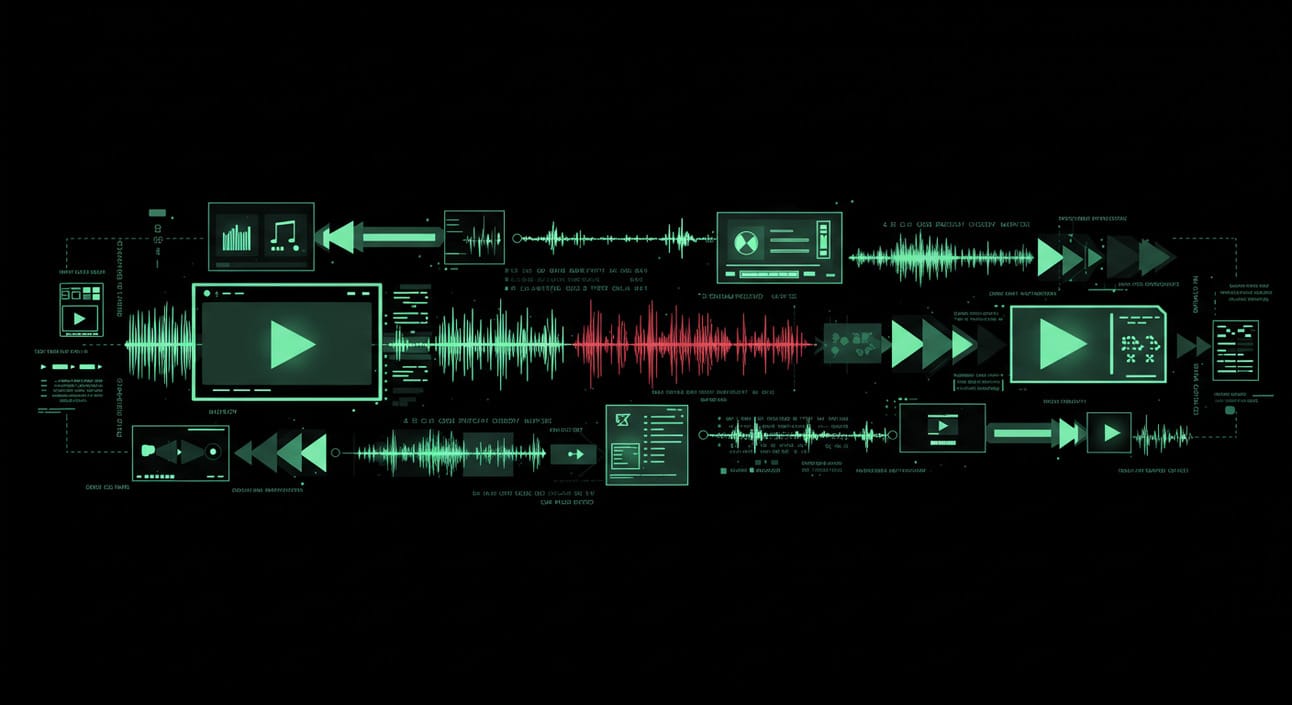
Video Assembly Aigents
Stitched Scenes, Voiceovers, and Captions: Bringing the Ad to Life
In Parts 1 and 2, we explored how the Scene Prep Aigent transforms raw video into structured data and how Storyboard Aigents create compelling narratives. Now, it's time to bring these elements together with the final components of aigencia's agentic ad system: the Video Assembly Aigents.
"The Storyboard Aigent gives us a blueprint. The Video Assembly Aigents are the builders that transform that blueprint into a finished ad, ready for the world to see."
The Final Mile in Automated Ad Creation
Traditional video production involves specialized roles: video editors who combine footage, sound designers who create audio landscapes, and post-production specialists who add captions and text overlays. Each step requires technical expertise and creative judgment.
The Video Assembly Aigents replace this fragmented process with a seamless, automated workflow that handles:
Scene stitching and transitions
Voiceover generation and synchronization
Caption creation and overlay
Final composition and delivery
Let's examine how each of these components works to create a polished, ready-to-deploy advertisement.
How Video Assembly Aigents Work
The Video Assembly Aigents represent a sophisticated multi-agent system that transforms matched scenes, voiceovers, and captions into a cohesive final advertisement. Here's how each component functions:

1. Video Combiner Aigent
The first agent in our assembly workflow takes the scenes identified by our vector search and stitches them together into a single video.
Input: Array of scene URLs and metadata
Output: Combined video file
This agent acts as a professional video editor, performing:
Scene Analysis: Examines each clip's properties (resolution, frame rate, codec)
Standardization: Transcodes videos to consistent parameters
Sequencing: Arranges clips in the order specified by the storyboard
Transition Application: Applies appropriate transitions between scenes
Format Optimization: Ensures the final output is optimized for web delivery
The Video Combiner Agent uses FFmpeg, a powerful media processing library, to handle the technical aspects of video stitching. It ensures consistent quality by analyzing each video and standardizing parameters like resolution, frame rate, and codecs.
"What once required specialized video editing skills now happens automatically, producing consistent, high-quality results every time."
2. Voiceover Aigent
The second agent generates and processes voiceovers for each scene based on the script provided in the storyboard.
Input: Scene voiceover text and timing
Output: Scene-specific voice recordings
This agent functions as a voice talent and audio engineer, handling:
Voice Generation: Creates natural-sounding voiceovers using advanced TTS models
Tone Matching: Applies appropriate emotional tone based on scene requirements
Timing Alignment: Ensures voiceovers match scene durations
Audio Quality: Processes audio for clarity and consistent volume
The Voiceover Agent uses OpenAI's brand new gpt-4o-mini-tts model to create human-like voiceovers with appropriate emotional inflection. This eliminates the need for professional voice talent recording sessions and post-production audio engineering.
3. Voiceover Overlay Aigent
This agent integrates the generated voiceovers with the combined video, ensuring perfect synchronization.
Input: Combined video and scene voiceovers
Output: Video with synchronized voiceover track
The agent acts as an audio mixing engineer, performing:
Audio Extraction: Removes or preserves original audio as needed
Voiceover Integration: Overlays voiceovers at precise timestamps
Audio Balancing: Ensures proper levels between voiceover and background audio
Seamless Transitions: Creates smooth audio transitions between scenes
The Voiceover Overlay Agent carefully synchronizes the audio with the visual elements, creating a professional soundscape that enhances the narrative impact of the advertisement.
4. Caption Generator Aigent
The fourth agent creates accurate captions based on the voiceover text, formatted for video display.
Input: Storyboard with voiceover text
Output: SRT caption file
This agent functions as a transcription and captioning specialist, handling:
Text Extraction: Processes voiceover text into caption segments
Timing Calculation: Creates precise timestamps for each caption
Format Conversion: Generates industry-standard SRT caption files
Style Application: Formats captions according to best practices
The Caption Generator Agent ensures accessibility and enhances viewer engagement by providing perfectly timed text that matches the spoken content.
5. Caption Overlay Aigent
The final agent in our workflow burns the captions directly into the video, creating a final product ready for distribution.
Input: Video with voiceover and SRT caption file
Output: Final video with integrated captions
This agent acts as a post-production specialist, performing:
Caption Integration: Burns captions directly into the video
Style Application: Applies appropriate font, size, and positioning
Readability Optimization: Ensures captions are clear against any background
Format Finalization: Produces the final video in web-optimized format
The Caption Overlay Agent completes the production process, delivering a polished advertisement that combines visuals, audio, and text into a cohesive whole.
The Orchestration Layer: Agent API
Tying all these components together is a sophisticated API layer that manages the entire workflow, from initial request to final delivery.
This orchestration layer:
Manages State: Tracks the progress of each step in the workflow
Handles Errors: Provides robust error handling and recovery
Delivers Updates: Sends webhook notifications at each stage
Stores Assets: Maintains all generated assets in organized storage
Provides API Access: Offers a clean interface for external systems
"The orchestration layer is the conductor that ensures each specialized agent plays its part at exactly the right moment, creating a symphony of automation that transforms concepts into compelling ads."
The User Experience: From Concept to Completion
From the user's perspective, the entire process is remarkably simple:
Enter a brief description of the ad concept and brand information
Receive a complete campaign brief, creative brief, and storyboard
Preview the matched scenes for each storyboard segment
Review the automatically generated voiceovers and captions
Receive the final compiled video advertisement
The entire process typically takes 3-5 minutes, compared to the days or weeks required in traditional workflows.
Strategic Advantages for Brand Founders
The Video Assembly Aigents deliver several transformative advantages:
1. Speed and Efficiency
What once took weeks of post-production now happens in minutes. This allows brands to move from concept to market with unprecedented speed, gaining competitive advantage.
2. Cost Reduction
By eliminating the need for video editors, voice talent, audio engineers, and post-production specialists, brands can produce professional-quality advertisements at a fraction of the traditional cost.
3. Iteration Velocity
Brands can quickly test multiple versions of advertisements, gather feedback, and refine their approach—all within the timeframe traditionally required just to produce the first draft.
4. Consistent Quality
The automated workflow ensures consistent quality across all advertisements, eliminating the variability often seen in human-produced content.
Conclusion: The New Production Paradigm
The Video Assembly Aigents represent the final piece in our complete agentic ad system, connecting the dots between concept and delivery. By orchestrating specialized AI agents that each handle a specific aspect of the production process, we've created a system that maintains the quality of traditional methods while dramatically reducing the time, cost, and complexity.
For brands, this means:
More content produced in less time
Higher quality for the same or lower cost
Faster time-to-market for campaigns
Increased ability to test and optimize
What's Next on Our Agentic Brand Journey
Next up on our Agentic Brand journey we'll explore Anthropic's MCP Server standard and how this can help brands stand out. The Model Capability Protocol (MCP) represents the next evolutionary step for brands that have already vectorized their content. Where vectorization makes your brand's information AI-readable, MCP creates a standardized interface for AI agents to interact with your brand's capabilities in real-time.
Book a call with gentic to implement AI agents at your brand.
